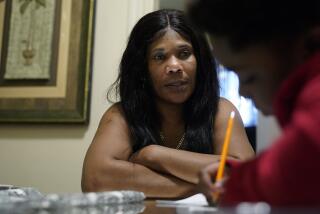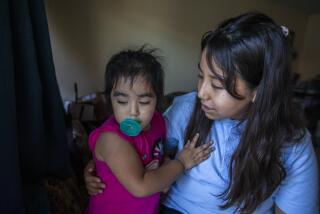Father of School Strategy Tells How to Involve Parents
- Share via
Dr. James P. Comer came from a poor black family struggling to survive in the grimy steel town of East Chicago, Ind., after his father died when he was 6. Yet he, along with his brothers and sisters, made it through high school and beyond to garner 13 college degrees.
Success came in large part because of their mother, who Comer says worked terribly hard to nurture a learning environment at home. She was also dogged enough to figure out the school’s way of doing things and work with teachers to boost the school’s expectations for her children.
Yet Comer remembered three close classmates from elementary school who fell short along the way--one who died early of alcoholism, a second who ended up in jails most of his life, the third who has spent much of his life in mental institutions.
Using his own experiences, the professor of psychiatry at Yale Medical School asked what could be done to help the large number of minority parents who--unlike his mother--have been unable by themselves to give their children the tools to be good learners, despite innate qualities of caring and a desire to want to help.
Today he can point to the “Comer Model” as the fruit of his long research. It is a deceptively simple prescription for educators to bring parents and children into the school culture and boost academic achievement by making them feel welcome, in large part, through a comprehensive social program.
First tried in New Haven, the Comer plan has taken root in a half-dozen communities around the nation and will be a key part of renewal plans at three San Diego Unified District schools beginning in the 1990-91 school year: Baker Elementary in Southeast San Diego, Valencia Park Elementary, and Jackson Elementary in East San Diego.
Comer talked about the ABCs of his model while in San Diego last week to address graduates at the UC San Diego Medical School. The plan, now part of Yale’s School Development Program that he oversees, was chosen in January for $3 million in annual funding by the Rockefeller Foundation over the next five years.
At its heart is the fact that parental support is critical to academic achievement of children.
“Children attach first to their own parents and to the social network that the parents are part of, and they carry those attitudes and values and ways as they develop, and they interact with school people based on these norms they take from home,” Comer said.
“When those norms are in line with the mainstream culture of the school--mainstream or middle-class values and attitudes--then there is no problem. But, when those attitudes are marginal, or antisocial, you’ve got a problem when those kids go to school.”
Many low-income minority parents did not have successful experiences in school themselves, Comer said. Therefore they need help to see how they can sustain a teacher’s efforts at home and give realism to those same dreams they hold for their children as do middle-class parents.
“The school has to understand that learning is not simply a mechanical process based on ability, but that it grows out of the quality of relationships that the teacher has with the child, that the teacher has with the parents, and that the parents have with the child,” Comer said.
“Teachers have no power if they don’t deal with the home-school relationship issue.”
But how to get at the problem, when many teachers already feel overworked and overwhelmed by the social problems of many children who show up in their classes?
In essence, the school needs to reach out to parents through social interactions, beginning with potluck suppers, welcome-back nights, Christmas parties and the like, at which genuine respect between the two groups can begin to develop.
Once that rapport takes root, the school can move to seminars at which teachers and parents talk about the math program, about the English program, about ways that parents can help at home, ways parents can talk with their children at the supermarket, “about all sorts of ways parents can mediate,” or expand, on learning experiences that happen in school. There can be sessions on child-rearing techniques and related activities.
“Rather than teaching parents per se, you create the programs that allow them” to bring those skills to school that they may already have “and which the school can take advantage of,” Comer said.
“The parents find out that the climate of the school is supportive” and they begin to emphasize behaviors at home that will integrate with those behaviors required of children at school, Comer said. “And then the children see that their parents aren’t dumb, that their parents represent the same kinds of models being pushed in the classroom.”
The key mechanism for integrating the many activities is called the governance and management team, a group of parents, teachers and school support employees headed by the principal. The team receives support from two other bodies: a parent team and a mental-health team composed of a social worker, psychologist, special education teacher, nurse, and counselors.
The management team draws up the social calendar for the year, a listing of all the parent-school activities with which the school can draw parents gradually into its web, Comer said. But these activities must relate to the academics as much as possible, and not just deal with things on the periphery of school programs.
As one example, Comer cited a field trip planned to a Jackie Robinson exhibit in New York for a New Haven school. “We talked to children about the skills they would need on the trip and we practiced them, such as what to say to Mrs. Robinson, how to ask questions about the exhibit, how to conduct yourself going down on the bus, where you stop for lunch, all these things relating to social skills but also to language skills, the curriculum as well,” Comer said.
Many parents attended as well, picking up on these skills “but without ever having to say, ‘I don’t know how to do this’ and being reluctant to participate.”
In another case, the mental health team noticed that students transfering into a school often displayed anti-social behavior, such as hitting teachers or other students.
“Out of those cases, the team recognized that the school needed a transfer policy, and so it developed an orientation program for new students and helped prevent that problem from” remaining prevalent.
Comer said that, although many parts of his model sound simple, “I’m not saying that this is very easy, since there are difficult times, but I’m not saying it’s all that tough either.
“The major difficulty can come if you have people (at the school) whose personalities won’t allow them to share with or respect people who are poor, or different.”
Comer also is worried that representatives from the three San Diego schools may not have spent enough time in New Haven observing how the model operates, although at one school in Texas, teachers successfully put the plan into effect merely from reading about Comer’s work.
“Also, there has to be agreement that you don’t focus on faults of teachers or parents, that there has to be consensus decision making, and that there can’t be winners or losers, in that the principal is ignored or that the principal ignores other people,” Comer said.
Under average conditions, Comer said three years may be necessary to see significant improvements in a school.
In the beginning, a school might have only five or six parents who participate, but Comer said educators should not panic. Comer gave the example of one parent in New Haven who initially could not understand why the school had any interest in having her show up.
“She felt she had nothing she could contribute to professionals, but after a period of time, after getting involved in some activities, she recognized she had some ability,” Comer said.
The woman eventually finished high school, went to college and is now a dean of a community college.
“But, in general, we’re talking about parents simply becoming better teachers of their children, giving skills that make them succeed in school academically, by having the school create experiences for them that will lead to that.
“Otherwise, when you have parents who stay away from school, that is a model that says to children that ‘schools are dangerous for us, that they are not like us.’ ”
More to Read
Sign up for Essential California
The most important California stories and recommendations in your inbox every morning.
You may occasionally receive promotional content from the Los Angeles Times.













